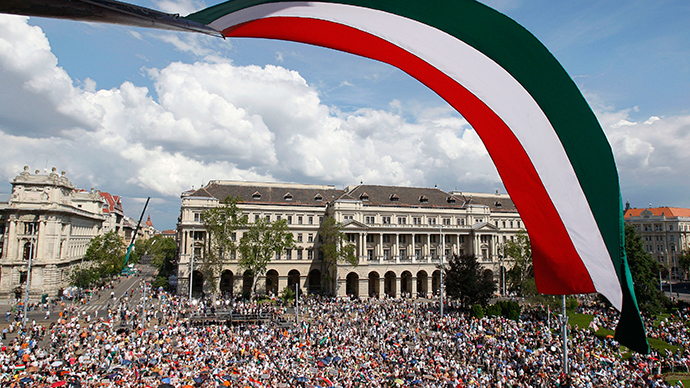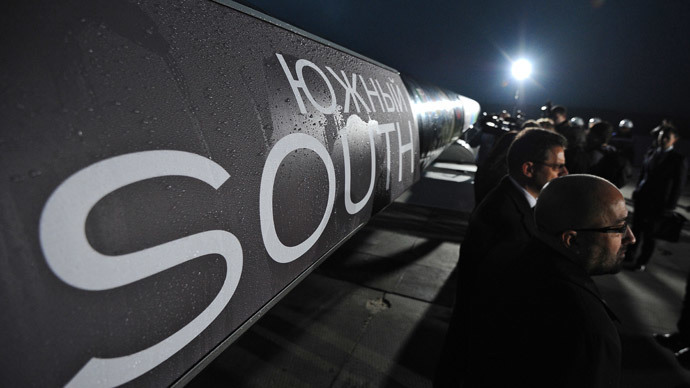The bullying of Hungary – the country that dared to disobey the US and EU

25 years ago, Hungary was being toasted in the West for opening its border with Austria to East Germans, in a move which led to the fall of the Berlin Wall. Now the Western elites are not happy with Budapest which they consider far too independent.
The refusal of Prime Minister Viktor Orban and his ruling Fidesz party to join the new US and EU Cold War against Russia, which has seen the Hungarian parliament approving a law to build the South Stream gas pipeline without the approval of the European Union, in addition to the populist economic policies Fidesz has adopted against the largely foreign owned banks and energy companies, has been met with an angry response from Washington and Brussels.
Hungarian officials have been banned from entering the US, while the European Commission has demanded that the Hungarians explain their decision to go ahead with South Stream. That’s on top of the European Commission launching legal action against the Hungarian government for its law restricting the rights of foreigners to buy agricultural land.
The bullying of Hungary hasn’t made many headlines because it’s so-called “democrats” from the West who have been doing the bullying.
Viktor Orban is not a communist, he is a nationally-minded conservative who was an anti-communist activist in the late 1980s, but the attacks on him and his government demonstrate that it doesn’t matter what label you go under - if you don’t do exactly what Uncle Sam and the Euro-elite tell you to do - your country will come under great pressure to conform. And all of course in the name of “freedom” and “democracy.”
Fidesz has been upsetting some powerful people in the West ever since returning to power in 2010. The previous “Socialist”-led administration was hugely popular in the West because it did everything Washington and Brussels and the international banking set wanted. It imposed austerity on ordinary people, it privatized large sections of the economy, and it took out an unnecessary IMF loan. Ironically, the conservative-minded Fidesz party has proved to be much better socialists in power than the big-business and banker friendly “Socialists” they replaced.
One of the first things that Fidesz and its coalition allies, the Christian Democratic People’s Party, (KDNP) did was to introduce an $855m bank tax - the highest such tax in Europe - a measure which had the financial elite foaming at the mouth.
Orban clashed with the IMF too, with his government rejecting new loan terms in 2012, and paying off early a loan taken out by the previous government, to reduce interest payments.

In 2013, Orban took on the foreign-owned energy giants with his government imposing cuts of over 20% on bills. Neoliberals expressed their outrage at such “interventionist” policies, but under Orban, the economy has improved. Although it’s true that many still look back nostalgically to the days of “goulash communism” in the 1970s and 80s when there were jobs for all and food on the table for everyone. Unemployment fell to 7.4 percent in the third-quarter of this year; it was around 11 percent when Fidesz took power, while real wages rose by 2.9 percent in the year up to July.
The man his enemies called the “Viktator,” has shown that he will pursue whatever economic policies he believes are in his country’s national interest, regardless of the opinions of the western elite who want the Hungarian economy to be geared to their needs.
His refusal to scrap his country’s bank tax is one example; the closer commercial links with Russia are another. Russia is Hungary’s third biggest trading partner and ties between the two countries have strengthened in the last couple of years, to the consternation of western Russophobes. In April, a deal was struck for Moscow to loan Hungary €10 billion to help upgrade its nuclear plant at Paks.
Orban’s policy of improving trade and business links with Russia, while staying a member of the EU and NATO, has however been put under increasing strain by the new hostile policy towards Moscow from Washington and Brussels.
Orban again, has annoyed the West by sticking up for Hungary’s own interests. In May he faced attack when he had the temerity to speak up for the rights of the 200,000 strong Hungarian community living in Ukraine.”Ukraine can neither be stable, nor democratic, if it does not give its minorities, including Hungarians, their due. That is dual citizenship, collective rights and autonomy.” Hungary’s Ambassador was summoned to the Foreign Ministry in Kiev. Donald Tusk, Prime Minister of Poland, the US’s most obedient lapdog in Eastern Europe, called Orban’s comments “unfortunate and disturbing” as if it was anything to do with him or his country.
In August, Orban accurately described the sanctions policy of the West towards Russia as like “shooting oneself in the foot.”“The EU should not only compensate producers somehow, be they Polish, Slovak, Hungarian or Greek, who now have to suffer losses, but the entire sanctions policy should be reconsidered,” Orban said.
In October, Hungarian Foreign Minister Peter Szijjarto also questioned the sanctions on Russia, revealing that his country is losing 50 million forints a day due to the policy.
Hungary has made its position clear, but for daring to question EU and US policy, and for its rapprochement with Moscow, the country has been punished.
It’s democratically elected civilian government which enjoys high levels of public support, has ludicrously - and obscenely - been likened to military governments which have massacred their opponents. "From Hungary to Egypt, endless regulations and overt intimidation increasingly target civil society," declared US President Barack Obama in September.
Last month there was another salvo fired at Hungary - it was announced that the US had banned six unnamed Hungarian government officials from entering America, citing concerns over corruption- without the US providing any proof of the corruption.

"At a certain point, the situation, if it continues this way, will deteriorate to the extent where it is impossible to work together as an ally," warned the Charge D’Affaires of the US Embassy in Budapest, Andre Goodfriend. The decision and the failure to provide any evidence, understandably caused outrage in Hungary. “The government of Hungary is somewhat baffled at the events that have unfolded because this is not the way friends deal with issues," said Janos Lazar, Orban‘s chief of staff.
The timing of the ban has to be noted, coming after the Hungarian government had criticized the sanctions on Russia and just before the national Parliament was due to vote on the South Stream pipeline. The pipeline, which would allow gas to be transported from Russia via the Black Sea and the Balkans to south and central Europe without passing through Ukraine, is a project which Russophobes in the West want cancelled.
"I am inclined to think that it is a punishment for the fact that we talk to Russia," said Gabor Stier, the head foreign policy editor of the leading Hungarian newspaper Magyar Nemzet.
"America thinks that we are corrupt, but we are a sovereign state, and it is our business. Many people in the United States do not like that Viktor Orban is very independent…..Corruption is just an excuse."
It’s hard to disagree with Stier’s conclusions. Of course, there is corruption in Hungary, as there is in every country, but it pales in comparison with some countries who are faithful US allies and who Washington never criticizes. The 2013 Corruption Perceptions Index compiled by Transparency International, reveals that Latvia, the Czech Republic, Croatia, Romania, Bulgaria and Bosnia-Herzegovina are all below Hungary, as indeed is Italy. Yet it’s Hungarian officials that the US is banning.
True to form, the attacks on Orban and his government in the Western media have chimed with the political attacks. ‘Is Hungary, the EU’s only dictatorship?’ asked Bloomberg View in April. The BBC ran a hostile piece on Orban and Fidesz in October entitled Cracks Emerge in leading party, and which referred to “government corruption” and “the playboy lifestyle of numerous party officials.”
The piece looked forward to the end of Fidesz rule.
While earlier this week, the New York Times published an OpEd by Kati Marton, whose late husband Richard Holbrooke, was a leading US diplomat, entitled Hungary’s Authoritarian Descent. You’d never guess that the Hungarian government wasn’t the flavor of the month in the West would you?

The question which has to be asked is: will Hungary be the next country to be the target of a US/EU sponsored regime change?
We all know what happened to the last Viktor who refused to sever links with Russia. Will Orban suffer the same fate as Ukraine’s Yanukovich? There are good reasons for believing that he won’t.
Fidesz did make a mistake by announcing the introduction of a new internet tax last month, which brought thousands onto the streets to protest but they have since dropped the plans and the problem for the US and EU is that Orban and his government remain too popular. In October’s local elections Fidesz won 19 of Hungary’s 21 larger towns and cities, including the capital city Budapest, not bad for a party that‘s been in power since May 2010.
Orban’s brand of economic populism, combined with moderate nationalism, goes down well in a country where people remember just how awful things were when the neoliberal “Socialists” were in power. His style of leadership may be authoritarian, but Hungarians prefer having a leader who has cut fuel bills and reduced unemployment to one who mouths platitudes about “liberal democracy” but who imposed harsh austerity measures and leaves them unable to afford the daily essentials.
Moreover Hungary, is already a member of the EU and NATO unlike Ukraine under Yanukovich and isn't about to leave either soon. On a recent visit to America Foreign Minister Peter Szijjarto told the US TODAY newspaper “US is our friend, US is our closest ally.” The US clearly wants more from Hungary than just words, but while both Washington and Brussels would like to see a more obedient government in Budapest, the “liberal” and faux-left parties they support simply don't have enough popular support for the reasons outlined above. And things would be even worse for the West if the radical nationalist party Jobbik, the third largest party in Parliament, and which made gains in October’s local elections, came to power- or if there was a genuine socialist/communist revival in the country. The fact is that Orban is in a very strong position and he knows it. That’s why he feels able to face down the threats from abroad and maintain a level of independence even though total independence is impossible within the EU and NATO.
We can expect the attacks on Orban and his government to intensify but the more the West attacks, the more popular Orban, who is able to present himself as the defender of Hungary’s national interests, becomes.
Hungary gave the West everything it wanted in 1989, and, as I pointed out here, its “reform” communist leadership was richly rewarded. But in 2014 it’s a very different story. In the interests of democracy and small countries standing up to bullying by powerful elites, long may Hungary’s spirited defiance continue.
Hajra, magyarok! Hajra Magyarorszag!
The statements, views and opinions expressed in this column are solely those of the author and do not necessarily represent those of RT.
The statements, views and opinions expressed in this column are solely those of the author and do not necessarily represent those of RT.













